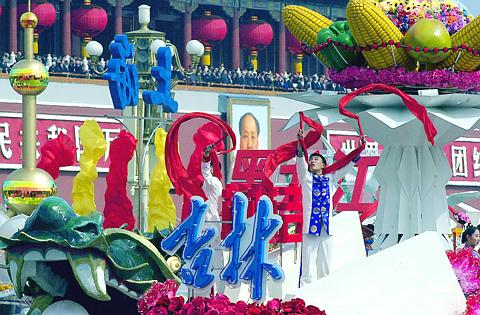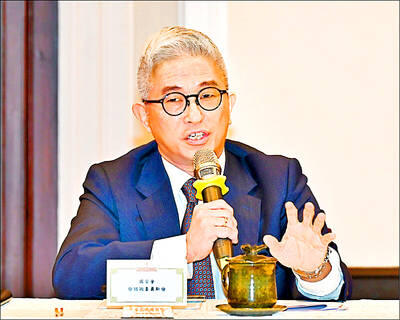China celebrated the 50th anniversary of communist rule yesterday, orchestrating a nationwide festival of patriotic pride that presented a seamless-looking display of political unity and popular happiness.
With a grand parade rolling into central Beijing yesterday morning, crowned by gleaming new missiles, shiny tanks and gaudy floats, China's leaders put together a show intended to project a jubilant manifestation of national strength and harmony. A temporary state of martial law in much of Beijing ensured that the event was cheered on by hundreds of thousands of pre-arranged onlookers.
Yesterday's party probably demonstrated the government's resilient organizational skills more than any genuine national strength. The celebration was so huge -- with 500,000 participants -- and was perceived by the authorities as so critically important that it became a significant political event in itself.

PHOTO: AP
President Jiang Zemin presided over events yesterday, and the festivities might as well have been called "Jiang's Show."After months of groundwork, yesterday's parade crowned Jiang's efforts to lift himself to the same historical plane as China's two great modern leaders, Mao Zedong and Deng Xiaoping.
Jiang stood alone in an open-backed limousine that reviewed a miles-long line of military hardware, one of many pieces in yesterday's festivities that looked distinctly reminiscent of former communist regimes in Russia and Eastern Europe, now all gone.
"Comrades, hello!" Jiang yelled to the assembled troops, who included camouflage-green-clad marines, blue-suited air force officers and militia women in red mini-skirted uniforms. "You are working hard!"
Though he looked tentative and uncertain as he stepped to the rostrum at Tiananmen -- the Gate of Heavenly Peace -- and remained dour and unsmiling, Jiang was clearly meant to appear firmly in charge. Alone among top leaders yesterday, he wore a Mao suit.
"After 50 years of trials and tribulations, all the people of the country must unite even more tightly around the Party center with Jiang Zemin as its core," said the Beijing Youth Daily in a typical hymn to the leader.
Yet to many Chinese, Jiang displays no vision or charisma worthy of Mao or Deng, nor does he even seem to believe in the communist ideology that he still talks about in public. He often seems to symbolize the government's confused stance on its most basic issue: Should China be communist or capitalist?
Outsiders often remark at the seemingly peaceful coexistence of Communist Party rule and burgeoning capitalism. Yet a quiet battle is actually under way all over this country, visible on any street corner in Beijing where McDonald's restaurants or mobile-phone stores signal the arrival of hard-to-control entities in China.
It is also evidenced in countless instances where government officials are forced to confront their gradual loss of control over many fields, such as the Internet. Recently, Information Industry Minister Wu Jichuan abruptly announced a ban on foreign investment in Internet-related companies, a potentially devastating step backward.
His ministry has spent years building telecommunications equipment, and the country's leaders have said that they want to embrace the Internet as a critical tool for Chinese companies and researchers and students. Yet if it is carried out, China's young Internet industry, and many of its best entrepreneurs, may feel forced to work abroad.
In China's media, the 50th anniversary has been occasion to release, under the pretense of a consideration of history, long strings of praise and seemingly mindless slogans.
"The course of 50 years of struggle tells us that only socialism can save China," said the Communist Party newspaper People's Daily in an editorial yesterday morning.
The party's claim to national strength and tranquility are belied by tough limits on freedom of speech or assembly, rights that are spelled out in China's constitution, particularly about a political issue as sensitive as Oct. 1 itself.
"We were told what to print," said a Shanghai newspaper editor, referring to coverage of the Oct. 1 celebrations. "There was no discussion, no variation, no room to change anything."
See also: China at 50 and

A car bomb killed a senior Russian general in southern Moscow yesterday morning, the latest high-profile army figure to be blown up in a blast that came just hours after Russian and Ukrainian delegates held separate talks in Miami on a plan to end the war. Kyiv has not commented on the incident, but Russian investigators said they were probing whether the blast was “linked” to “Ukrainian special forces.” The attack was similar to other assassinations of generals and pro-war figures that have either been claimed, or are widely believed to have been orchestrated, by Ukraine. Russian Lieutenant General Fanil Sarvarov, 56, head

SAFETY FIRST: Double the number of police were deployed at the Taipei Marathon, while other cities released plans to bolster public event safety Authorities across Taiwan have stepped up security measures ahead of Christmas and New Year events, following a knife and smoke bomb attack in Taipei on Friday that left four people dead and 11 injured. In a bid to prevent potential copycat incidents, police deployments have been expanded for large gatherings, transport hubs, and other crowded public spaces, according to official statements from police and city authorities. Taipei Mayor Chiang Wan-an (蔣萬安) said the city has “comprehensively raised security readiness” in crowded areas, increased police deployments with armed officers, and intensified patrols during weekends and nighttime hours. For large-scale events, security checkpoints and explosives

‘POLITICAL GAME’: DPP lawmakers said the motion would not meet the legislative threshold needed, and accused the KMT and the TPP of trivializing the Constitution The Legislative Yuan yesterday approved a motion to initiate impeachment proceedings against President William Lai (賴清德), saying he had undermined Taiwan’s constitutional order and democracy. The motion was approved 61-50 by lawmakers from the main opposition Chinese Nationalist Party (KMT) and the smaller Taiwan People’s Party (TPP), who together hold a legislative majority. Under the motion, a roll call vote for impeachment would be held on May 19 next year, after various hearings are held and Lai is given the chance to defend himself. The move came after Lai on Monday last week did not promulgate an amendment passed by the legislature that

PENTAGON ASSESSMENT: A US report said that even as China and Russia deepen their partnership, cooperation is hindered by a ‘mutual distrust’ of each other The Chinese People’s Liberation Army (PLA) as of October had doubled the number of ships and airplanes deployed around Taiwan compared with the previous two years, Vice Minister of National Defense Hsu Szu-chien (徐斯儉) said yesterday, a day after the opposition-controlled legislature voted against reviewing the government’s general budget for next year, including a NT$1.25 trillion (US$39.71 billion) special defense spending bill. The legislature’s vote against the Ministry of National Defense’s spending plans was regrettable, as the budget was designed to respond to the developing Chinese military threat, Hsu said on the sidelines of a legislative meeting on the general budget. Defense